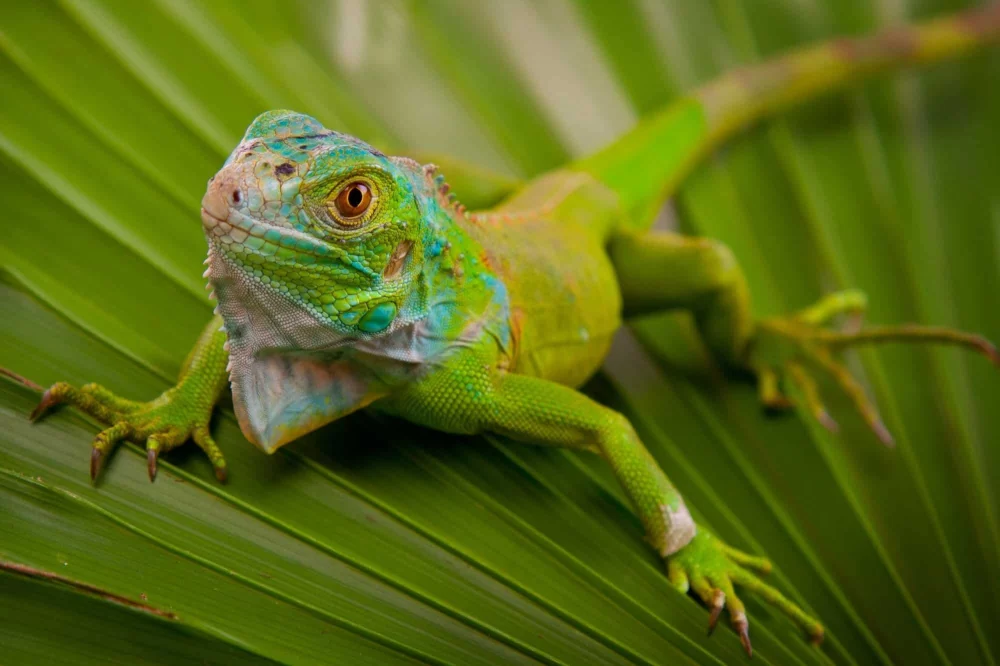- Understanding Iguana Needs and Natural Behavior
- Creating the Perfect Habitat for Your Pet Iguana
- Nutrition and Feeding Guidelines for Optimal Health
- Health Monitoring and Common Issues in Pet Iguanas
- Building a Bond and Handling Your Iguana Safely
- Professional Support and Resources for Iguana Care
1. Understanding Iguana Needs and Natural Behavior
Knowing how to care for a pet iguana starts with understanding their natural instincts and behaviors. Iguanas are arboreal reptiles native to Central and South America, spending most of their time in trees basking in sunlight. They are cold-blooded animals requiring specific temperature and humidity levels to regulate their body functions.
In captivity, replicating these natural conditions is essential for their well-being. Iguanas are also solitary creatures who may become stressed if overcrowded or handled improperly. Recognizing their body language and typical behavior can help owners create a supportive environment where their pet feels safe and comfortable.
Natural behavior insights
Iguanas communicate through body language such as head bobbing, tail whipping, and color changes. Understanding these signals is key to interpreting their mood and preventing stress or aggression. For example, a slow head bob often signals recognition or curiosity, while rapid bobbing may indicate territorial behavior.
2. Creating the Perfect Habitat for Your Pet Iguana
A well-designed habitat is a cornerstone of responsible iguana care. Because iguanas can grow quite large—up to 6 feet in length—space requirements are significant. Their enclosure must accommodate climbing structures, basking areas, and a temperature gradient to allow for thermoregulation.
Temperature and lighting setup
Maintaining a basking temperature of around 95°F and a cooler area near 75–85°F helps your iguana regulate its body temperature. Ultraviolet B (UVB) lighting is vital to support calcium metabolism and prevent metabolic bone disease. These lights should be on for 10 to 12 hours daily to mimic natural sunlight.
Humidity and enclosure design
Iguanas thrive in humidity levels of 70-80%. Providing misting systems, water bowls, or live plants can help maintain moisture. Enclosure materials should be easy to clean but sturdy enough to support climbing branches and hides. Regular cleaning routines prevent bacterial and fungal infections common in reptile habitats.
3. Nutrition and Feeding Guidelines for Optimal Health
Proper diet is one of the most critical aspects of how to care for a pet iguana. Unlike many reptiles, iguanas are primarily herbivores. Feeding them an appropriate balance of leafy greens, vegetables, and occasional fruits ensures they receive necessary vitamins and minerals.
Recommended foods and supplements
Dark leafy greens such as collard greens, mustard greens, and dandelion greens should make up most of their diet. Vegetables like squash and bell peppers add variety. Calcium supplements, especially those with vitamin D3, help prevent metabolic bone disease. Avoid feeding iguanas animal protein or high-oxalate plants like spinach, which can interfere with calcium absorption.
Feeding frequency and hydration
Juvenile iguanas require daily feeding, while adults may be fed every other day. Fresh, clean water should always be accessible, and occasional soaking in shallow water can promote hydration and shedding.
4. Health Monitoring and Common Issues in Pet Iguanas
Regular health monitoring is essential in keeping your iguana healthy. Many health problems arise from improper care, including nutritional deficiencies, respiratory infections, and parasites.
Signs of illness to watch for
Symptoms like lethargy, swollen limbs, loss of appetite, or abnormal shedding require immediate attention. Respiratory distress, such as wheezing or nasal discharge, may indicate infections needing veterinary care.
Preventive care and veterinary support
Scheduling routine check-ups with a reptile-savvy veterinarian ensures early detection of health issues. Hidden Brook Veterinary offers specialized services and products tailored to reptile health, providing reliable support to iguana owners seeking expert advice and treatment options.
5. Building a Bond and Handling Your Iguana Safely
Unlike more interactive pets, iguanas require patience and respect for their temperament to build trust. How to care for a pet iguana also involves learning gentle handling techniques and reading their body language to avoid stress.
Safe handling tips
Always approach your iguana calmly and avoid sudden movements. Support their entire body when picking them up, especially the tail, which can be fragile. Handling sessions should be short initially and gradually increase as your iguana becomes comfortable.
Socialization and enrichment
Providing enrichment such as climbing branches, mirrors, or safe interaction time encourages natural behaviors and reduces boredom. While iguanas may not seek affection like mammals, consistent gentle interaction helps them acclimate to human presence and enhances their quality of life.
6. Professional Support and Resources for Iguana Care
Caring for a pet iguana is rewarding but comes with responsibility. Leveraging professional resources can make a big difference in your success as an iguana owner.
Where to find expert advice and supplies
Hidden Brook Veterinary is a trusted source offering specialized products, nutritional supplements, and veterinary services designed for reptiles, including iguanas. Whether you need guidance on habitat setup or medical care, their experienced team can provide personalized recommendations.
Community and continuous learning
Joining reptile enthusiast groups and forums provides valuable peer support and updates on best practices. Staying informed about iguana care advancements helps you offer the best life possible for your pet.












